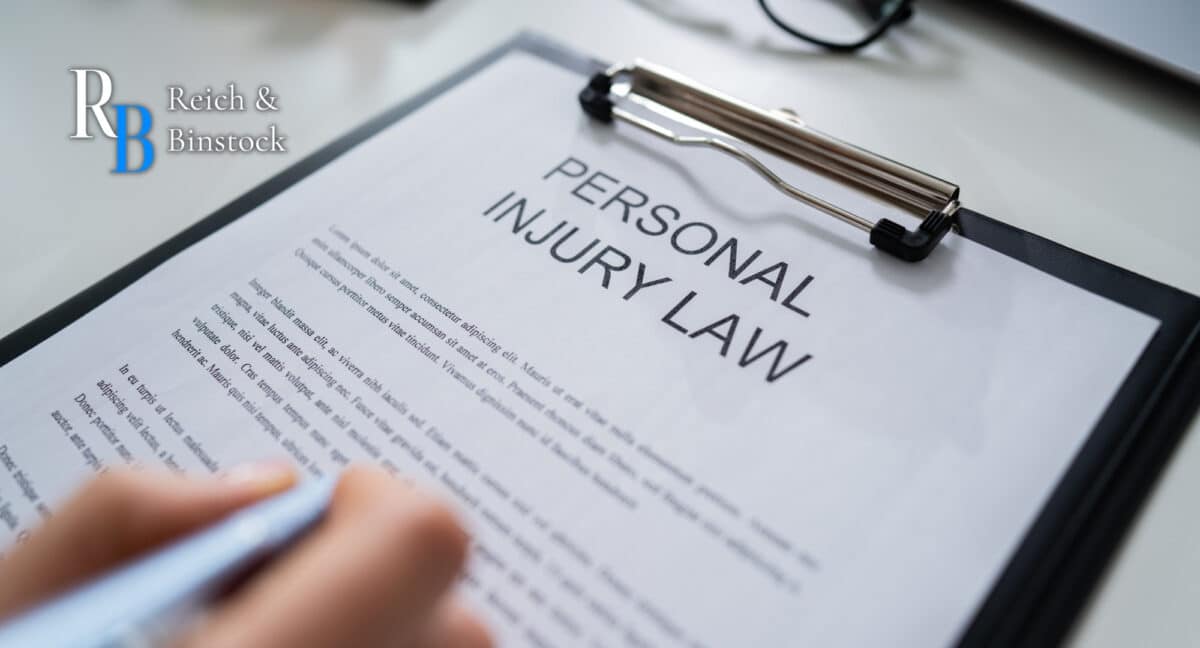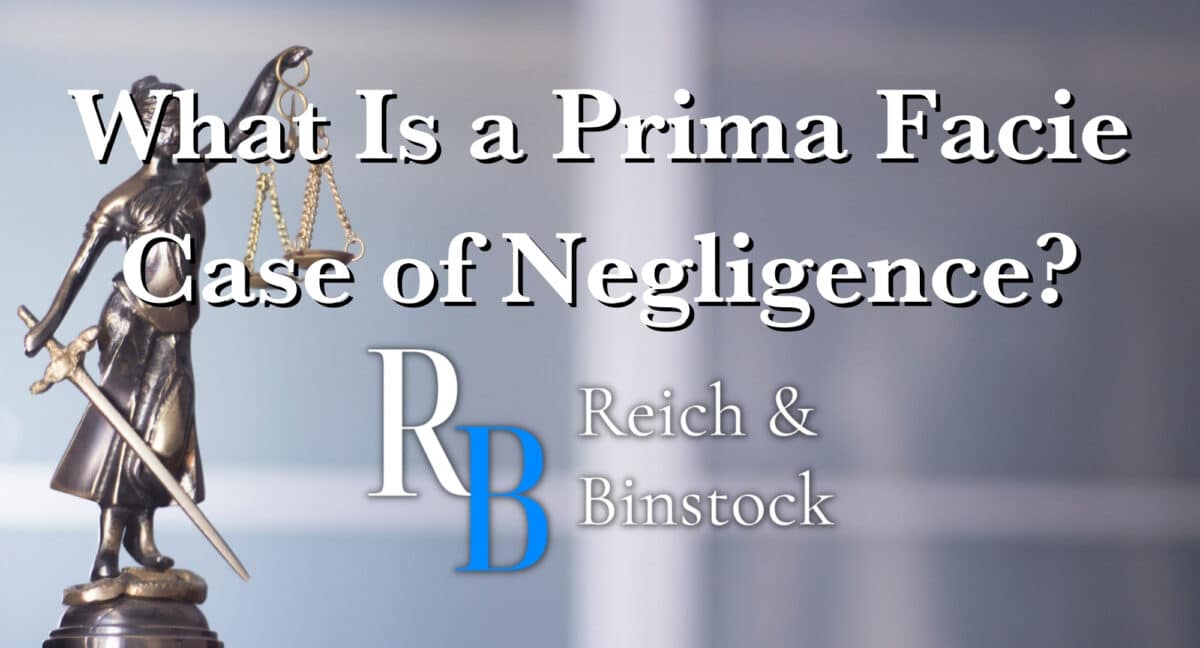Sometimes, it’s difficult for even the most skilled legal professionals to fully understand the law. This is partly due to the widespread use of Latin terms and phrases throughout the laws of our nation. Many people dismiss this “legalese” as gibberish that is nearly impossible to understand. However, with the help of a skilled attorney, anyone can understand the complicated nature of terms and phrases in criminal law. One commonly misunderstood phrase is “prima facie case of negligence.” This is what we cover in this blog.
At Reich & Binstock, we understand that certain aspects of the legal realm can be very confusing for those who didn’t go to law school. That’s why it’s important to work with a skilled attorney for any case you might have. We’ve been studying the law and legal terms for years, so we’re well equipped to represent you. To schedule a consultation with us, please call 713-622-7271 today. Contact our Houston personal injury attorneys for a free consultation.
What Is the Prima Facie Rule?
The prima facie rule explains that, in both civil and criminal cases, there is enough evidence to support a case. In other words, there is enough evidence to move forward with a trial or a judgment. Generally, the plaintiff or prosecutor must present prima facie evidence to satisfy the burden of proof for each charge against the defendant. If the prima facie evidence is not satisfactory, or if the defendant presents contradictory evidence, the claim may be dismissed.
More or less, prima facie evidence is a way of evaluating whether or not there is enough evidence against the defendant to proceed.
What Does Prima Facie Mean?

Prima facie literally means “based on first impression.” It translates from its Latin meaning to explain whether or not a case, at first sight, is ready for trial. Basically, it asks if there is enough evidence. It is an important part of many legal actions, especially those that pertain to criminal cases. However, it is also useful for cases involving tort law.
The party with the burden of proof has a prima facie case if they can present enough evidence to establish a verdict in their favor. This is, of course, assuming that the opposing party does not have contradictory evidence. If the party with the burden of proof cannot present enough evidence for a prima facie case, the opposing party can push for a verdict in their own favor.
It’s important to remember that, even if you successfully establish a prima facie case, you do not automatically win the case. The opposing party can still present evidence to rebut that case. If possible, you can then attack that rebuttal evidence with more evidence.
What Is an Example of Prima Facie?
When we apply the term to lawsuits, we can refer to a prima facie case as an “open and shut case.” This is because so much evidence exists that is very obvious to the court. Several important examples exist in prima facie cases, including the following:
- Check fraud cases
- Drunk driving personal injury cases
- Burglary cases
- Employment discrimination
- Breach of contract cases
What Are the Four Elements of a Prima Facie Case?
Prima facie evidence is extremely important in cases involving tort law. It operates with the goal of relieving the plaintiff of the harm caused by the defendant. It applies in specific cases where the defendant had malicious intentions, but their actions were not technically unlawful. The plaintiff has the burden of proof to show that the defendant’s actions met all prima facie tort case requirements. These requirements are as follows.
- The plaintiff shows that the defendant had a legal duty not to cause them harm.
- The plaintiff breached that duty with malicious intent and no legitimate justification.
- Actual damages occurred due to the breach of duty.
- The breach of duty directly caused those damages.
How to Prove Prima Facie Negligence
The four elements we listed above are crucial in proving a prima facie negligence case. However, there is another more mathematical approach to evaluating prima facie evidence. This is known as the “hand formula” or the BPL formula. The formula is B = PL. Basically, if PL is greater than B, the defendant should be held liable. If B is greater than or equal to PL, the defendant should not be held liable.
Hand Formula Variables
- B: This equals the burden of the precautions that the defendant took or could have taken.
- P: This equals the probability of an accident occurring.
- L: This equals the severity of losses resulting from the accident.
Let’s break this down into bite-sized pieces. If the burden of precautions is more significant than the possibility of and loss resulting from an accident, we cannot hold the defendant accountable. This is because it would have been more burdensome for the defendant to take precautions than for the accident and loss to occur. However, if the defendant’s burden of taking precautions is less than the accident and losses, then we can hold them accountable.
Here’s an easy example involving premises liability. A dog owner knows that their dog is aggressive toward strangers and keeps the dog in their fenced yard. It is very easy for the dog owner to put up a warning sign about the dog on their property, so they are unlikely to win a case in which someone is harmed by the dog. The same principle applies to many other cases.
What Are Common Cases of Prima Facie Negligence?

It is very common to see prima facie evidence in personal injury cases. Common examples include the following.
- A Houston car accident occurs in which the defendant was greatly intoxicated and could not make the proper decisions while driving.
- Someone slips and falls on a wet floor with no warning sign.
- Someone knowingly owns a dangerous dog and continues to let it roam around the neighborhood or walk it without a leash. If the dog bites someone, this is enough to determine negligence.
The phrase prima facie means that these cases should be very easy to prove. However, a defendant will likely try to cast doubt on the case or present evidence supporting their own case. They will likely attempt to present sufficient evidence to show that their burden of precaution was much greater than the likelihood of an accident and the resulting losses. If this happens, you and your attorney must work together to present the evidence required to prove the defendant’s guilt. In other words, the probability of an accident was very high, and your losses were significant.
How to Gather Evidence of Negligence
In civil cases, the plaintiff may think that there is sufficient evidence to prove obvious negligence. However, it is still important to ensure that the evidence offered by the defendant will have enough merit to prove their case. There are many ways to gather other evidence to cast reasonable doubt on the defendant’s case. We list these below.
- Get a copy of the police report or a copy of reports for workplace accidents.
- Keep all copies of medical expenses and records.
- Take photos and videos at the scene if you can.
- Start keeping journal entries about the effect of how the defendant acted and how that affected your family.
If, upon initial examination, the evidence at first appearance is not enough, then gathering more should help your case. You and your attorney can prove negligence if you offer evidence disputing the claims of the defendant. This should cast reasonable doubt on their arguments and strengthen your case.
What Is Prima Facie Eligibility?
A case meets the prima facie obligation when a judge determines that the prosecution’s proof or evidence is self-evident enough to proceed to trial. The judge must review the evidence and ensure that all the components for a prima facie case are present. Suppose they are not. The burden shifts to the defendant to rebut the evidence and show their innocence.
What Are Prima Facie Duties?
You may hear the phrase “prima facie duties” while attempting to understand the legal duty owed by the defendant to the plaintiff. The phrase comes from a thinker named W. D. Ross, who was a Scottish philosopher. The duties he speaks of are those we list below.
- Keeping promises and contracts that you make unless they are morally overridden
- Always telling the truth
- Making up for the injuries that someone causes another person
- Being grateful for gifts and giving things in return
- Refraining from harming others both physically and mentally
- Preventing harm from happening to others
- Doing good deeds to or for others
- Improving oneself and promoting positive habits
- Striving for justice and fairness in all things
Although it may seem like an obvious and implicit set of duties, it is important to understand that many laws we abide by today come from various thinkers and philosophers throughout history. A Latin phrase that we may encounter during legal proceedings likely has a rich history aside from its presence in our modern laws. Understanding these origins can help attorneys craft strong cases for their clients.
Should I Hire a Lawyer for a Prima Facie Case?
Even if you feel that the evidence you have is more than sufficient enough to prove your case, it is never a bad idea to seek legal help from an attorney. At Reich & Binstock, our attorneys have studied the law tirelessly for many years, as we believe that knowledge and experience are the best tools at our disposal. The better we understand the law and its nuances, the better we can argue your case in court. For more information about the cases we handle, please call our Houston law office at 713-622-7271 today.













